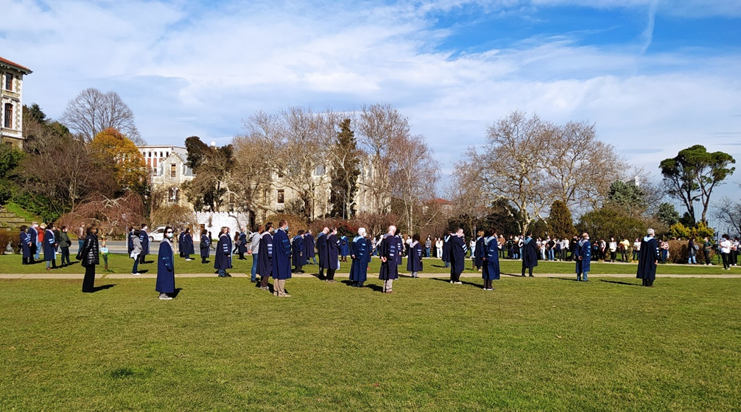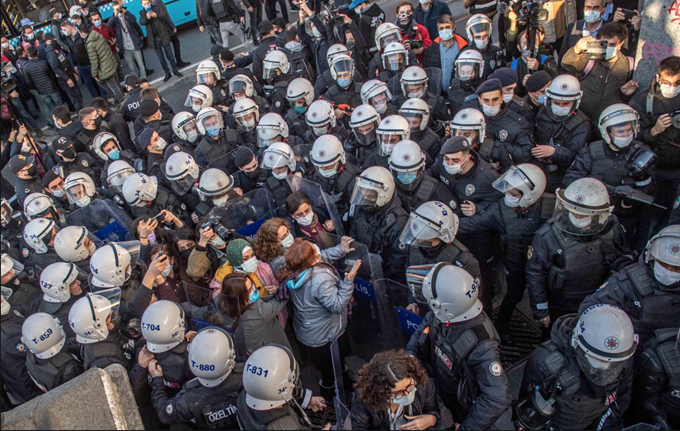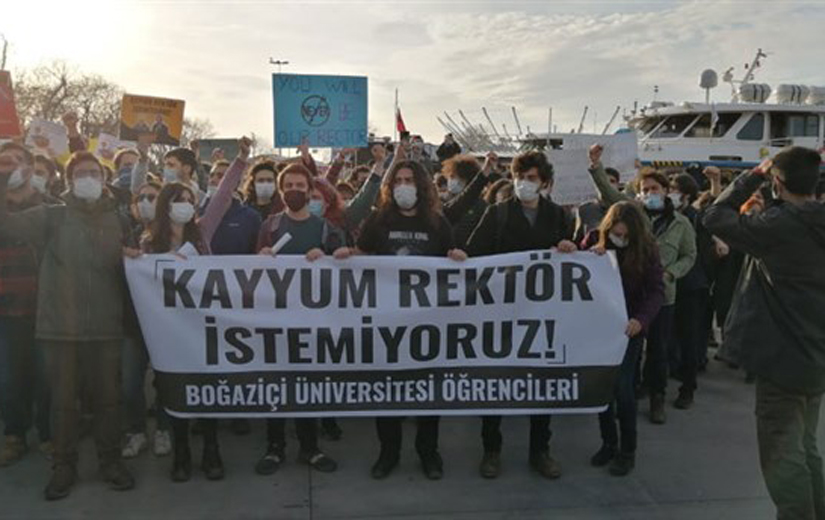The recent student protests in Istanbul expose the continuously corrupt nature of the AKP government and its curtailment of civil liberties.
Contemporary Turkish politics have been defined by a tension between the military and the central government, with opposition groups acting on the periphery and rising up during the times of chaotic political avalanches. For instance, the early 1970s saw intense street fighting by students committed to the idea of a socialist revolution. As anthropologist Leyla Neyzi has observed, within the public sphere, the era came to define the identity of the Turkish youth as rebels. Even then, student protests embodied an idealistic striving to reconstruct Turkish society “in the name of the people”.
At the end of the last century, Turkey attempted a “democratic turn”, in its striving to gain EU membership. This development questioned the long-pursued mythical idea of a Turkish nation – the legacy of Kemalism – however untenable such nationalist fantasy was under the conditions of a multi-ethnic, multi-religious territory of the former empire. In response, military officials had resisted many of the demands for democracy, but nevertheless faced limited opposition from the government.
Enter political Islamism. In 2001, Adalet ve Kalkınma Partisi (Justice and Development Party, AKP) was founded by a group of mostly conservative, well-educated, Islamist politicians. AKP has ruled the country uninterruptedly since 2003, having consolidated their power mostly by reforming the National Security Council through redirecting the posts to civilians rather than military officials.
The fear of the Islamist agenda of AKP erupted in 2007 demonstrations to protest the election of the then Prime Minister Recep Tayyip Erdoğan as President. At the same time, AKP blocked the military’s opposition to AKP’s Islamism by reconstruing the concerns as unacceptable military intervention – sort of a soft-core coup d’état. The oppositional efforts were in vain, and soon AKP freely launched its agenda through a series of educational reforms that focused on a heavily ethno-nationalist and Islamic re-interpretation of Turkish identity.
Since the 1970s, the Middle East has experienced a boom in political activism across universities. The academic structure has traditionally provided students and staff with a political platform, wherein oppositional views can be expressed freely. The expansion of education across the post-imperial world has facilitated the process of a relatively laissez-free approach to higher education, ensuring that universities often become the hotbeds for leftist political action. Predictably, therefore, in the aftermath of the 2016 coup, AKP launched an assault on academic freedoms.
In 2017, the government dismissed over three hundred academics from their posts under the pretence of “fighting terrorism”. This had been an almost unceasing trend since July 2016, when thousands of academics were purged and over 15,000 education workers lost their jobs. One can only imagine which “good citizens” have been placed in the new vacancies. In 2016, Erdoğan made his position clear:
“There is no difference between a terrorist with a gun and bomb in his hand and those who use their work and pen to support terror. The fact that an individual could be a deputy, an academic, an author, a journalist or the director of an NGO does not change the fact that that person is a terrorist.”
Furthermore, the body which supervises higher education, Yükseköğretim Kurulu (Council of Higher Education, YOK), is continuously expected to stifle political debate in universities and – as the 2014 campus regulations state – to sanction all groups and individuals who engage in “non-scientific” debate. Academics who do not follow YOK’s and AKP’s expectations are forced to self-censor and live in fear of persecution.
There is an obvious degree of continuity in AKP’s policy demonstrated by the recent student protests in Istanbul. Melih Bulu, an AKP politician and the founder of the AKP branch in the Sariyer district of Istanbul, had been appointed rector of Boğaziçi University directly by Erdoğan. Erdoğan was able to appoint Bulu with no democratic process thanks to the increasingly authoritarian measures which followed the 2016 coup (which is often speculated to be an inside job).
Bulu’s several nominations for various political offices have mostly ended in failure, and his questionable academic credentials have been tarnished by multiple allegations of plagiarism. Since his appointment, the staff at Boğaziçi have been staging protests every day at 12 o’clock by turning their backs to the rector’s office and demanding his resignation.

Since Friday, the protests have turned violent following the brutal treatment of the peaceful protesters by the police. Bulu’s office was adorned with a poster of Mecca with superimposed rainbow flags, to which the Turkish Interior Minister Süleyman Soylu, a right-wing nationalist with long-standing anti-Kurdish sentiments, reacted by calling the suspects “four LGBT perverts”.
At least 200 people have been arrested, and Erdoğan has predictably reacted with the classic accusations of “terrorism” and “inciting hatred”. Police have used tear gas liberally and assaulted the protesters with riot shields – developments which unsurprisingly have been ignored by the government-restricted Turkish media. Just as in 2013, there are fears expressed by the ruling class that the demonstrations will escalate into broader anti-government, anti-Erdoğan protests.
Mass crackdowns against human rights group have been on the rise in Turkey since the early 2020, with the new bill on “Preventing Financing of Proliferation of Weapons of Mass Destruction”. The bill was introduced by Erdoğan at the demand of the UN Security Council, and it has empowered the Turkish government to monitor NGOs and seize their assets at will. It is not consumer corporations which are targeted by the practical implementations of the bill – but rather dissident organisations.

On Monday, Erdoğan gave a televised speech, during which he had attempted to call for unity and to draw on the continuous myth of the nation-state in which young people’s identities are assumed to be built upon the traditional values of family, nationalism, and service to the AKP state: “You are not the LGBT youth, not the youth who commit acts of vandalism. On the contrary, you are the ones who repair broken hearts.”
Students in Turkey are not simply protesting the appointment of Erdoğan’s crony. Turkish youth face a growing crisis – with regards to not only the curtailment of civil rights, but also to rampant nepotism and rising unemployment worsened by the pandemic. And Erdoğan’s solution to that is to accuse young people of betrayal of the nation’s “values”, to shift the blame to their supposed lack of piousness.
Erdoğan’s sentiments are empty and devoid of any acknowledgment of the real grievances of the Turkish youth. Academic freedom and student power are the pillars of a free-thinking, empowered, and liberated society – and Erdoğan’s regime will not stop until these are squashed.
In the late 1990s, Istanbul-based writer Murathan Mungan prophetically wrote: “I think Turkey has really come to lean against the wall. There is nowhere to go; either the wall will crumble, or it will be dismantled. If it crumbles, we will be crushed below, if it is dismantled maybe we will move to another space.”
Young people fighting against rampant violations of the democratic process and civil rights are the defining element of oppositional movements across the world – and particularly in the Middle East. Developing a robust, politically- and class-conscious student movement is vital for the preservation of our fight for a socialist society. The flame of the historic efforts of the Turkish youth to build a just world must never be extinguished.
These are the truths echoed by Elif, a Marxist-Leninist student organiser currently fighting for justice:
“The legitimacy of our protests, which we started as the Boğaziçi Resistance and that we have cultivated together with other universities, oppressed segments of society for more than a month, does not stem from the state violence we have been subjected to or our alleged “privileged” position. We demand a free academia and our fundamental rights. During this process, we have had many friends who were detained, arrested, sentenced to house arrest, and we have been targeted many times by the fascist government and its collaborators. It must be reminded again and again that protest is not a crime! The true politics is not done in the dark rooms of palaces with thousands of rooms, but on the streets. We are getting stronger with every attack, we continue our fight without looking back, for an academia which is governed by all components of the university. As LGBTI+ people who have been heavily targeted, comrades who have been subjected to physical and sexual violence by the police, minorities who have been criminalized for no reason other than being a minority, labourers who have been denied their rights and students whose will has been trampled upon, we will act shoulder to shoulder, with an overarching force, and never give up!”



